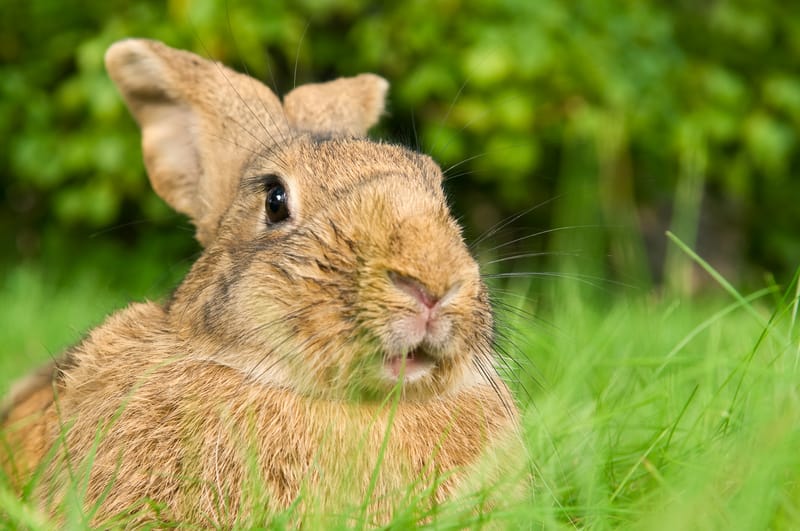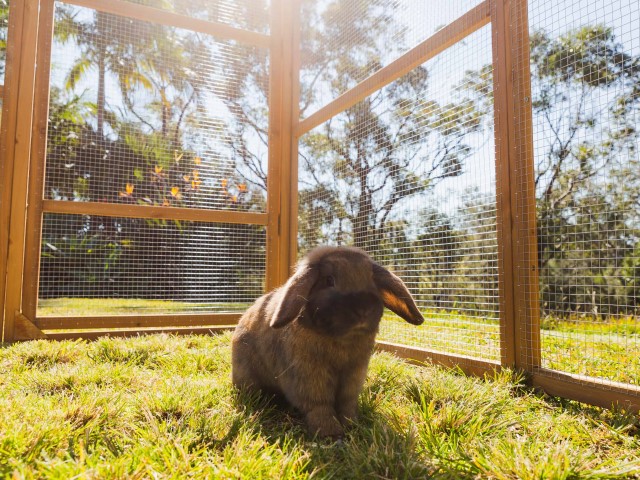Rabbits are gentle, social creatures that make great pets. They require lots of love and attention, as well as a safe and comfortable environment to thrive in. When it comes to housing your furry friend, choosing the right rabbit hutch is essential. A good-quality hutch will not only keep your rabbit safe but also provide a space for them to exercise and relax. With so many options available on the market, it can be overwhelming to decide which hutch is best for your rabbit. In this article, we'll discuss everything you need to know about choosing the perfect rabbit hutch.
Choosing the Right Rabbit Hutch

Before purchasing a rabbit hutch, there are a few factors that you should consider to ensure your bunny's comfort and well-being. These include size, materials, features, and safety. Let's delve into each of these factors in more detail.
Size and Space Requirements for Rabbit Hutches
The size of the hutch is a crucial factor to consider when choosing a home for your rabbit. Rabbits are very active animals and need plenty of space to move around, stretch their legs, and play. A cramped hutch can lead to health problems and behavioral issues in rabbits. The general rule of thumb is to have a hutch that is at least four times the size of your rabbit.
For a single rabbit, the hutch should be at least 4 feet long, 2 feet wide, and 2 feet tall. If you have two rabbits, the hutch should be at least 6 feet long, 3 feet wide, and 3 feet tall. This ensures that your rabbits have enough room to hop, run, and stand up on their hind legs without hitting their heads. Keep in mind that the bigger the hutch, the happier and healthier your rabbits will be.
In addition to the hutch size, rabbits also need a designated exercise area where they can stretch their legs and engage in daily activities. This area should be at least four times the size of the hutch and should include toys, tunnels, and hiding places for your rabbit to play with.
Materials Used in Rabbit Hutches
The material of the hutch is another crucial factor to consider. The most common materials used in rabbit hutches are wood, metal, and plastic. Each has its pros and cons, so it's essential to understand them before making a decision.
Wood Hutches
Wooden hutches are a popular choice for rabbit owners due to their aesthetic appeal. However, not all types of wood are suitable for rabbit hutches. Avoid using softwoods such as cedar or pine as they contain natural oils that can be harmful to rabbits. Hardwoods like oak, birch, and maple are a better option as they are non-toxic.
One of the downsides of wooden hutches is that they can be challenging to clean and maintain. Urine and feces can seep into the wood, causing stains and unpleasant odors. Wooden hutches also require regular sealing or painting to protect them from rotting. If you choose a wooden hutch, opt for a weather-resistant wood and ensure that it's properly sealed.
Metal Hutches
Metal hutches, typically made of wire mesh and metal frames, are very durable and easy to clean. They are also chew-proof, making them ideal for rabbits who are prone to chewing. However, one disadvantage of metal hutches is that they can be hot in the summer and cold in the winter, which can be uncomfortable for your rabbit. To combat this, provide your rabbit with plenty of bedding and insulation during extreme temperatures.
Plastic Hutches
Plastic hutches are lightweight, easy to clean, and often come in bright colors. However, they are not as durable as wooden or metal hutches and are susceptible to being chewed by rabbits. They also don't provide much insulation, making them unsuitable for outdoor use in extreme weather conditions.
Features of Rabbit Hutches
When choosing a rabbit hutch, it's essential to consider the features that will make it more comfortable for your rabbit. These include:
Multiple Levels
Rabbits love to hop and explore, so providing a hutch with multiple levels can keep them entertained and active. Just be sure that the levels are not too high, as rabbits can injure themselves from falling.
Solid Flooring
A solid floor is essential for a rabbit hutch, as wire mesh flooring can cause discomfort and injury to your rabbit's feet. If your hutch has a wire mesh floor, cover it with a solid surface like a piece of wood or plastic mesh.
Door and Locking Mechanism
The door and locking mechanism of the hutch should be sturdy and secure. This ensures that your rabbit cannot escape and predators cannot enter. Check that the door is large enough for you to reach in and remove your rabbit comfortably.
Easy Access Points
Some hutches come with removable trays that make cleaning easier. Look for a hutch with a large door or a top opening that allows you to access all areas of the hutch easily.
Types of Rabbit Hutches

There are several types of rabbit hutches available on the market, each with its unique design and purpose. Let's take a look at some of the most common types of rabbit hutches.
Basic Hutch
The basic hutch is a simple design with a flat roof and a wire mesh front. It usually has one or two levels and provides a safe and secure space for your rabbit. The main disadvantage of this type of hutch is the lack of space and features for your rabbit to play and exercise.
Two-Story Hutch
A two-story hutch is a popular choice for rabbit owners as it provides more space and features than a basic hutch. It consists of two levels, connected by ramps or stairs, and usually has a designated sleeping area on the upper level.
Double Decker Hutch
A double-decker hutch is similar to a two-story hutch but has an additional lower level. This type of hutch is ideal for multiple rabbits or if you have limited outdoor space.
Rabbit Runs
Rabbit runs are large enclosures that provide plenty of space for your rabbit to exercise and play. They come in various shapes and sizes and can be placed both indoors and outdoors. However, a rabbit run should not be used as a permanent home for your rabbit as they still require a sheltered area to protect them from harsh weather conditions.
Indoor vs. Outdoor Rabbit Hutches

Deciding whether to keep your rabbit hutch indoors or outdoors depends on several factors, including your living situation and climate. Each option has its pros and cons, so it's important to weigh them carefully before making a decision.
Indoor Rabbit Hutches
Indoor hutches are great for those living in apartments or colder climates. They provide protection from extreme temperatures, predators, and other outdoor elements. Keeping your rabbit indoors also allows for more interaction and supervision, which can strengthen the bond between you and your pet.
However, indoor hutches can take up a significant amount of space and may not be suitable if you have limited room in your home. Also, rabbits are naturally messy animals, so you'll need to clean the hutch regularly to prevent unpleasant odors in your home.
Outdoor Rabbit Hutches
Outdoor hutches are a popular choice for those with larger outdoor spaces and milder climates. They allow for natural sunlight and fresh air, which is essential for a rabbit's health and well-being. Outdoor hutches also provide plenty of space for your rabbit to run, play, and explore.
However, outdoor hutches are more exposed to predators and the elements, so you'll need to ensure that the hutch is secure and weather-proof. It's also crucial to provide adequate shelter and insulation during extreme weather conditions.
Cleaning and Maintenance of Rabbit Hutches
Keeping your rabbit hutch clean is essential for your rabbit's health and happiness. A dirty hutch can lead to health problems, unpleasant odors, and attract pests. Here are some tips for cleaning and maintaining your rabbit hutch:
- Clean the hutch at least once a week, or more often if needed.
- Remove any uneaten food and feces daily.
- Use a pet-safe disinfectant to clean the hutch thoroughly.
- Replace bedding regularly and spot-clean areas that your rabbit frequently uses.
- Ensure that the hutch is dry before placing your rabbit back inside.
- Regularly check for any signs of wear and tear and make necessary repairs.
It's also important to provide your rabbit with fresh water and a balanced diet to maintain their health and prevent any unpleasant smells in the hutch.
Accessories for Rabbit Hutches
Adding accessories to your rabbit hutch not only makes it more comfortable for your rabbit but also adds a touch of fun and personality. Here are some must-have accessories for your rabbit hutch:
Bedding
Rabbits need soft and absorbent bedding to keep them warm and comfortable. Avoid using pine shavings or cedar chips as they can be harmful to rabbits. Safe bedding options include paper-based bedding, straw, hay, or fleece.
Toys and Chews
Toys and chews are essential for keeping your rabbit entertained and preventing boredom. They also help keep your rabbit's teeth healthy, as rabbits have continuously growing teeth that need to be worn down through chewing. Some safe toy options include cardboard boxes, untreated wood blocks, and chew sticks.
Hideaways
Rabbits need a space to feel safe and secure, especially when they are sleeping. Providing a hideaway such as a cardboard box or a small house inside the hutch allows your rabbit to have their private space.
Safety Considerations for Rabbit Hutches
Your rabbit's safety should be a top priority when choosing and setting up a hutch. Here are some essential safety considerations to keep in mind:
- Ensure that the hutch is made of non-toxic materials.
- Remove any sharp edges or nails that could potentially harm your rabbit.
- Place the hutch in an area with good ventilation and natural light.
- Avoid placing the hutch near toxic plants or substances.
- Keep the hutch away from other pets or potential predators.
- Check the hutch regularly for any signs of wear and tear.
- Avoid overcrowding the hutch with too many rabbits or accessories.
Tips for Choosing the Perfect Rabbit Hutch
Choosing the perfect rabbit hutch can be overwhelming, but here are some additional tips to make the decision easier:
- Do your research and read reviews before purchasing a hutch.
- Consider your rabbit's size, age, and personality when choosing a hutch.
- Take into account the number of rabbits you have or plan to have in the future.
- Make sure the hutch is easy to assemble or comes with clear instructions.
- Choose a hutch with features that will cater to your rabbit's needs and preferences.
- Invest in a high-quality and durable hutch that will last for years to come.
Conclusion
Providing a safe and comfortable home for your rabbit is vital for their health and happiness. By considering factors such as size, materials, features, and safety, you can choose a suitable hutch for your furry friend. Remember to also provide plenty of love, attention, and a balanced diet to ensure your rabbit lives a long and happy life in their new home.



